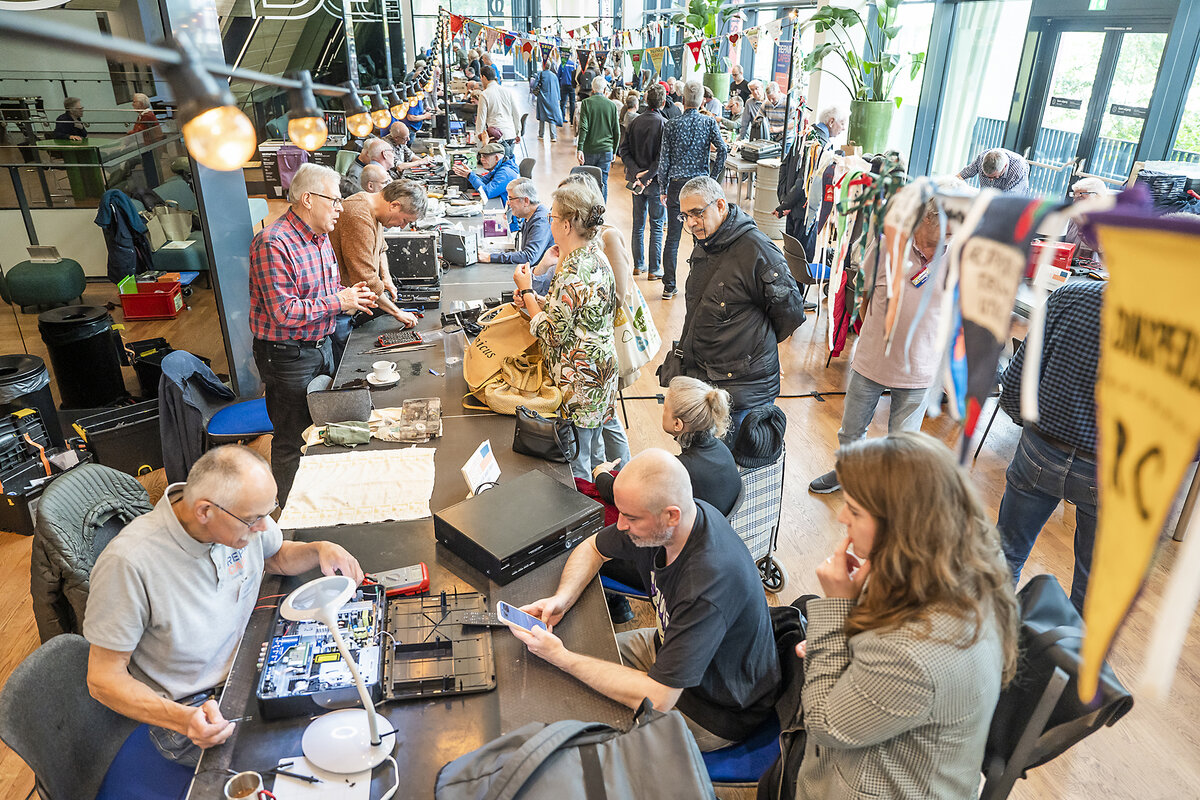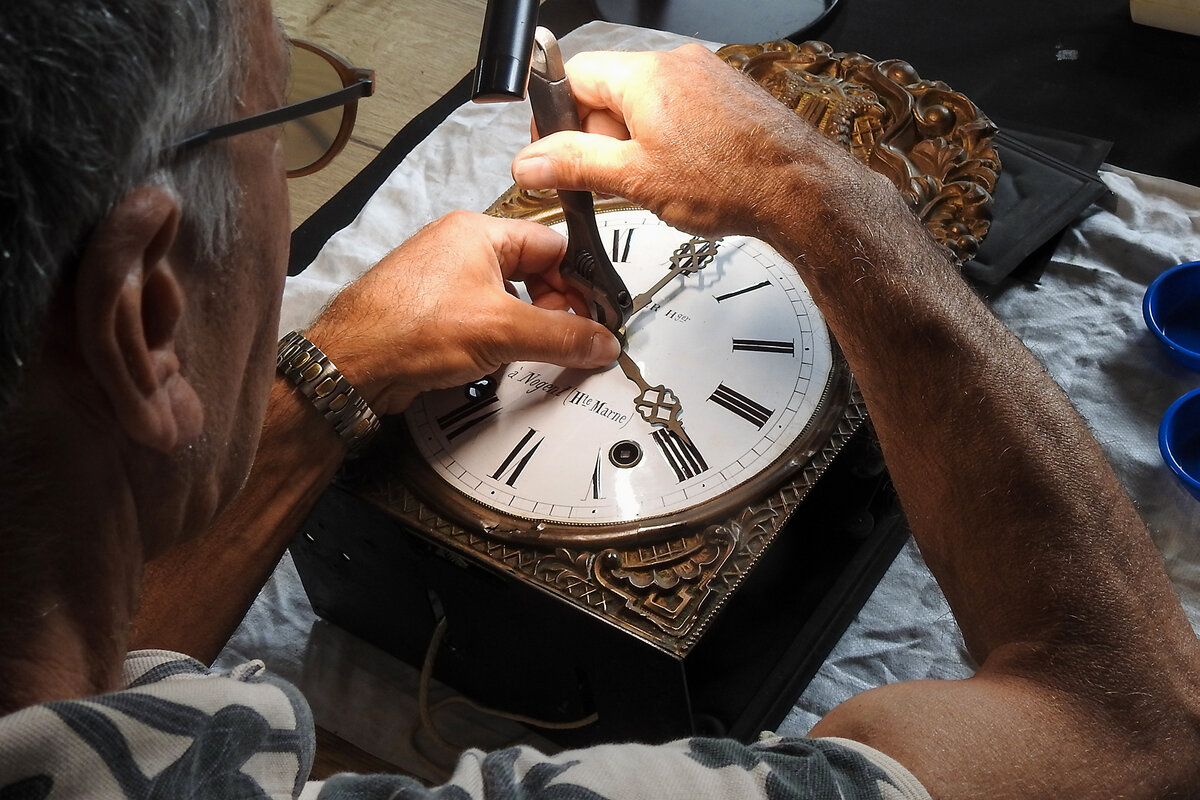The ‘Repair Café’ movement has become a powerful force for a fix-it culture
Loading...
| Amsterdam
It was 15 years ago when Dutch environmental journalist Martine Postma was finally moved to action over all the appliances she saw being thrown away in her Amsterdam neighborhood.
Despite being reparable, malfunctioning coffee machines, electric kettles, irons, and the like were ending up in landfills. And all the while, manufacturers made more and sold cheap, contributing to carbon dioxide emissions and exacerbating climate change, to Ms. Postma’s frustration. “At that time, repair was not seen as something normal,” Ms. Postma says. “You couldn’t do it anywhere.”
So on Oct. 18, 2009, she arranged a local event where volunteers skilled in repairs would try to fix broken devices that community members brought in, free of cost. She had no idea if anyone would show up.
Why We Wrote This
A story focused onToday’s throwaway culture is being challenged by a growing movement to try to fix rather than replace household appliances. The effort has even led to repair-friendly laws in many countries.
But as soon as the doors of the venue opened, people began streaming in with their defective items. In addition to all the repairs, the event created an opportunity for people of different social and economic backgrounds to come together and bond. “The huge interest really surprised me,” Ms. Postma says. “It showed that people want to do the right thing but have to be enabled to do so.”
Her first “Repair Café” turned out to be a resounding success.
Today, the Repair Café movement has spread to more than 40 countries across six continents, with nearly 3,200 Repair Cafés in operation, including 200-plus community repair programs in the United States. Moreover, the Repair Café Foundation, which Ms. Postma set up in 2010, has helped foster legislative changes to make repairing more accessible in Europe.
“The Repair Café Foundation has not only stuck around, but coalesced into a political force in the Western world that has driven the adoption of repair-friendly consumer laws,” says Adam Minter, a columnist for Bloomberg Opinion and the author of two books on waste, recycling, and reuse.
“That’s a notable contribution to early 21st-century sustainability,” he adds. The foundation “can be an important example in developed countries that no longer incorporate repair into most consumer product cycles.”
“Energy is saved”
Experts say that repair events are a vital step toward a more sustainable economy. “By extending the life of products, [they] reduce the demand for new raw materials,” says Jelle Pothoven, strategic communications adviser at Dutch environmental information organization Milieu Centraal. “When resources are conserved, the carbon footprint is lowered, and energy is saved.”
In 2023 alone, Repair Cafés around the world saved over 1.4 million pounds of broken appliances from going to a landfill, according to the foundation’s 2023 annual report. That translates to more than 33 million pounds of carbon dioxide emissions prevented from entering the atmosphere, based on the calculation method of British researcher Steve Privett.
Ms. Postma hopes that the reach of the cafés extends even further. Their current 3,200 “is still a very low number,” she says matter-of-factly. “Every community should have a Repair Café,” she adds. “We can have millions of Repair Cafés around the world.”
That ambition got a monumental boost in Europe when the European Union adopted a “right to repair” directive in April 2024. Ms. Postma and the Repair Café Foundation played a key role in achieving this milestone, with the legal text of the legislation mentioning Repair Cafés multiple times.
But for Ms. Postma and the foundation, the legislation is just the first step. They are now working toward an extension of this legislation, which currently applies only to a limited number of products.
Ms. Postma points out that under the current law, a manufacturer can offer to replace a broken item instead of repairing it, in situations in which repair is more expensive than replacement. “This rules out [fixing] a whole range of cheap and low-quality products, which are precisely the ones likely to break soon,” she says.
Bringing communities together
Repair Cafés have evolved over their existence, particularly in regard to who wants and supports them, Ms. Postma notes. In the beginning, it was mainly environmental activists who wanted to organize them, she says. But later, as it became evident that the cafés brought the community together, people who wanted to do something for their own neighborhoods also became interested.
“Over time, we’ve seen the motivations change and become broader,” says Ms. Postma. “Now with the starter kit, more people are starting their own Repair Cafés.” The starter kit is now available in English, Spanish, French, and German, in addition to Dutch, and can be downloaded for a voluntary fee of €49 ($53).
The attitudes of appliance manufacturers have also changed dramatically. “Earlier, product manufacturers didn’t want to be associated with us,” Ms. Postma says. “They said that repairing is dangerous, and that it shouldn’t be done by an amateur.”
Nowadays, manufacturers are themselves contacting the foundation. “They want to discuss the repairability of their products,” she says.
Robert Riede, who in 2018 co-founded the Repair Café Jeltje in Amsterdam’s Old West neighborhood, has observed another heartening trend. In the past, the main repair person has generally been someone who is retired or otherwise out of the workforce. But that is changing, he says. “A new generation – 25 to 35 years of age – is now spreading the Repair Café message.”
Ms. Postma is working toward getting repairing introduced as a subject in vocational schools. There is also a huge amount of interest from other educational institutions, which are using the foundation’s starter kit to set up Repair Cafés. “Parents don’t know how to repair, so they can’t teach their children,” she says. “It [repairing] needs to be taught in school.”
“Organizations like the Repair Café Foundation can and do play a critical role in presenting new ways of consuming and maintaining stuff, to a younger generation open to new forms of consumerism,” says Mr. Minter, the Bloomberg Opinion columnist.
Ms. Postma remains dedicated to her mission of making the infrastructure for getting repairs as rich and diverse as that for buying new items. “Getting a repair should be just as easy,” she says. “You should have many options when you want to get an item repaired.”
Like Repair Cafés, several other initiatives are steadily gaining momentum. The Restart Project in the United Kingdom focuses on the repair of electronic items, while Fixit Clinic in the U.S. organizes community repair events.
“More people now understand that we need to start consuming differently, use less resources, and create less waste,” Ms. Postma says.







